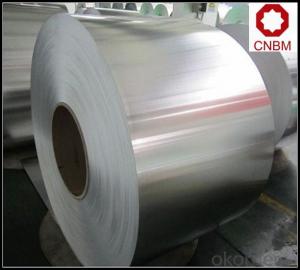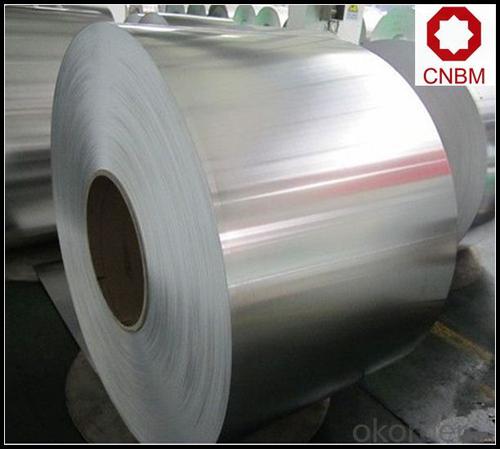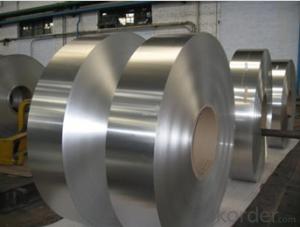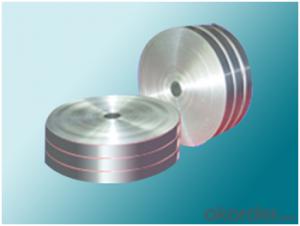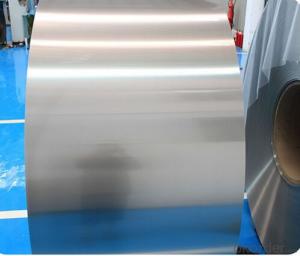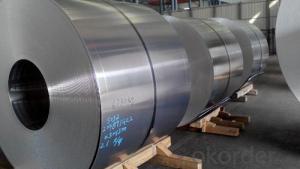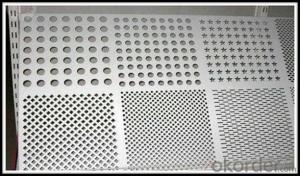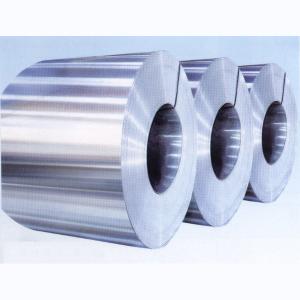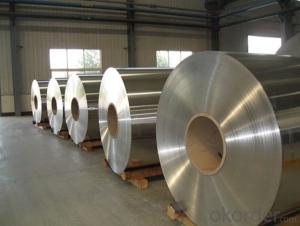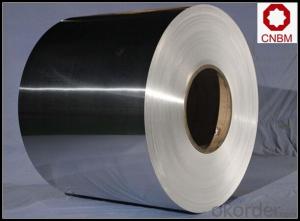Mill Finish Cost Price Aluminum Kick Plate Coil 1 Series
- Loading Port:
- Shanghai
- Payment Terms:
- TT OR LC
- Min Order Qty:
- 5 m.t.
- Supply Capability:
- 10000 m.t./month
OKorder Service Pledge
OKorder Financial Service
You Might Also Like
Specification
1. Specification of Mill Finish Cost Price Aluminum Coil
1) Alloy | 1050, 1060,1100, 3003 3004 3105 3A21 5005 5052 etc |
2) Temper | O/H12/H14/H1/H18/H32/H34/H36/H38//H111/H112/H116/H321/T6/T651/T3/T351 etc |
3) Thickness | 0.1mm to 6mm |
4) Width | 20mm to 3300mm |
5) Coil weight | 100kgs to 6 tons depends on actual requirement |
6) Core material | Aluminum or paper |
7) Coil Inner diameter | 75mm, 150mm, 200mm, 300mm, 405mm, 505mm or as required |
8) Protective film can be added
2. Application of Mill Finish Cost Price Aluminum Coil
(1).Interior: wall cladding, ceilings, bathrooms, kitchens and balconies, shutters, doors...
(2).Exterior: wall cladding, facades, roofing, canopies, tunnels,column covers , renovations...
(3).Advertisement: display platforms, signboards, fascia, shop fronts...
3. Feature of Mill Finish Cost Price Aluminum Coil
*Such coil is specially designed to replace aluminum ingot, due to the high export tax of aluminum ingot, the coil has better price than ingot.
*This type of coil can fit customer's remelting furnace just like ingot, no need to make any change to the production line that was previously used for ingot. The standard coil size and weight is very suitable for the feed gate of furnace.
*This type of coil causes less material wastage than ingot when remelted.
*Our coil is made directly from ore, no need to go though the ingot making process, quality is much better than other suppliers who use ingot scrap to make coil.
Be free from Oil Stain, Dent, Inclusion, Scratches, Stain, Oxide Dicoloration, Breaks, Corrosion, Roll Marks, Dirt Streaks and other defect which will interfere with use
4. Certificate
SGS and ROHS(if client request, paid by client), MTC(plant provided), Certificate of Origin(FORM A, FORM E, CO), Bureau Veritas and SGS (if client request, paid by client), CIQS certificate
5. Image of Mill Finish Cost Price Aluminum Coil
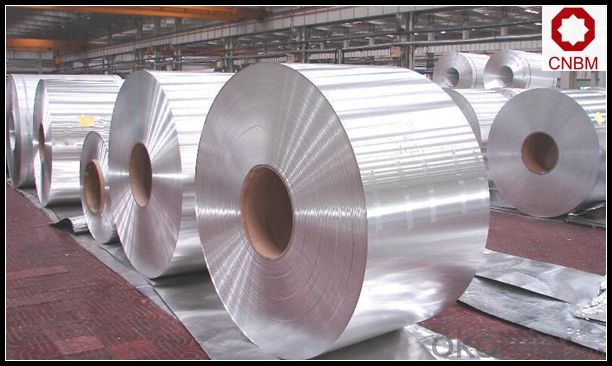
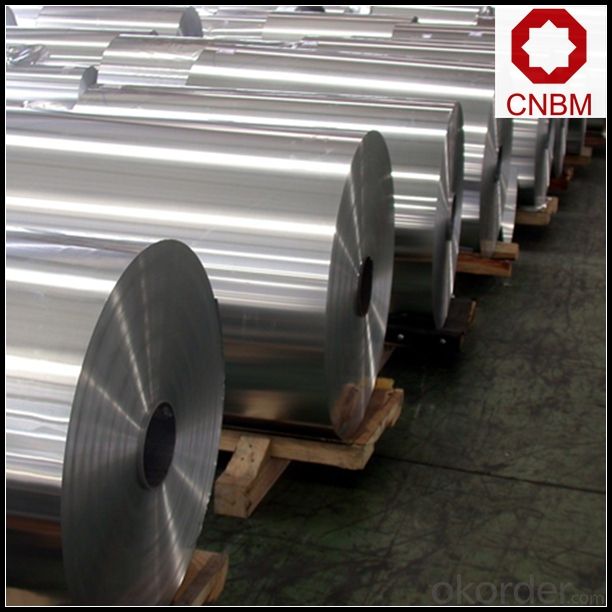
6. Package and shipping of Mill Finish Cost Price Aluminum Coil
eye to wall
eye to the wall
with wood pallet (wooded case also available)
7. FAQ
1) What is the delivery time?
Dpends on actual order, around 20 to 35 days
2)What is the QC system:
We have QC staff of 20 persons and advanced equipment, each production is with MTC traced from Aluminum ingot lot.
3) What market do you mainly sell to?
Australia, America, Asia, Middle East, Western Europe, Africa etc
- Q: Can aluminum coils be used for aerospace applications?
- Yes, aluminum coils can be used for aerospace applications. Aluminum is a commonly used material in the aerospace industry due to its unique combination of lightweight, strength, and corrosion resistance properties. Aluminum coils are used to manufacture various components and structures in aerospace applications, such as aircraft frames, wings, fuselages, and engine parts. The use of aluminum coils in aerospace applications helps to reduce the overall weight of the aircraft, which in turn improves fuel efficiency and enhances performance. Additionally, aluminum coils can be easily formed, welded, and machined, making them suitable for the complex shapes and structures required in aerospace engineering.
- Q: What is the typical width tolerance for aluminum coils?
- Depending on the specific industry and application, the width tolerance for aluminum coils can vary. Typically, the width tolerance for aluminum coils is around ±0.005 to ±0.010 inches. This means that the actual width of the aluminum coil can vary within this range from the specified target width. It is important to understand that these tolerances can be stricter or more lenient depending on the specific requirements of the customer or application. Furthermore, aluminum coil manufacturers often provide different width tolerances for different grades or thicknesses of aluminum coils. Therefore, it is essential to refer to the manufacturer's specifications or guidelines for accurate information on the width tolerance for a particular aluminum coil.
- Q: Are aluminum coils suitable for cryogenic applications?
- Aluminum coils are well-suited for cryogenic applications. The properties of aluminum make it an excellent choice for use in low-temperature environments. To begin with, aluminum has a low melting point, enabling it to remain solid and maintain its structural integrity even at cryogenic temperatures. This is particularly crucial in applications that involve extreme cold, such as cryogenic storage or transportation. Moreover, aluminum exhibits good thermal conductivity, allowing for efficient heat transfer. Managing and controlling heat flow is important in cryogenic applications to prevent temperature fluctuations or thermal stress. Aluminum coils effectively remove heat from the system, ensuring stable and consistent temperatures. Additionally, aluminum is lightweight and possesses a high strength-to-weight ratio. This is extremely advantageous in cryogenic applications where weight and space constraints are often critical. Aluminum coils contribute to reducing the overall system weight, resulting in improved efficiency and cost-effectiveness. Lastly, aluminum is corrosion-resistant, a vital characteristic in cryogenic environments where moisture or other corrosive substances may be present. Aluminum coils withstand harsh conditions and maintain their performance and durability over extended periods. In conclusion, aluminum coils are indeed suitable for cryogenic applications due to their low melting point, good thermal conductivity, lightweight nature, and corrosion resistance. They offer a multitude of benefits and effectively meet the demands of such challenging environments.
- Q: Is it possible to determine the spring constant of an aluminum coil using a spring compressor?
- <p>Yes, you can use a spring compressor to measure the spring constant of an aluminum coil. The spring constant (k) can be calculated using Hooke's Law, which states that the force exerted by a spring is proportional to its displacement (F = kx). By applying a known force to the spring and measuring the resulting displacement, you can calculate the spring constant. A spring compressor can apply a controlled force, and a displacement gauge can measure the compression, allowing you to determine the spring constant accurately.</p>
- Q: Can aluminum coils be used in transformer windings?
- Transformer windings can indeed utilize aluminum coils. Aluminum is a widely employed material for transformer windings because its resistivity is low, conductivity is high, and it is cost-effective compared to copper. It possesses numerous advantages, including being lighter in weight, having superior thermal conductivity, and yielding lower manufacturing expenses. However, there are certain considerations to keep in mind when using aluminum coils in transformer windings. For instance, a larger cross-sectional area is necessary to compensate for its lower conductivity when compared to copper. Furthermore, special techniques may be required to prevent galvanic corrosion when aluminum comes into contact with other metals within the transformer. All in all, aluminum coils can serve as a viable substitute for copper coils in transformer windings, providing benefits in terms of efficiency and cost.
- Q: How are aluminum coils used in the packaging industry?
- The packaging industry relies heavily on aluminum coils due to their exceptional properties and versatility. These coils are extensively employed in the creation of diverse packaging materials. A primary use of aluminum coils in the packaging industry is the production of aluminum foil. This thin sheet of aluminum is utilized for numerous packaging applications. Its flexibility, light weight, and outstanding barrier properties make it perfect for preserving the freshness, taste, and quality of food products. Aluminum foil is commonly employed for wrapping food items like sandwiches, snacks, and leftovers. It is also used to package pharmaceutical products, cosmetics, and other consumer goods. Additionally, aluminum coils are employed to manufacture aluminum cans, which are widely used to package beverages such as soda, beer, and energy drinks. Aluminum cans are lightweight, durable, and offer excellent protection against light, oxygen, and moisture. They also have a longer shelf life compared to other packaging materials, ensuring the preservation of taste and quality. Furthermore, aluminum coils are employed in the production of blister packs, which find common use in the pharmaceutical industry. Blister packs consist of a plastic sheet with individual compartments for medications or capsules. The aluminum coil is laminated onto the plastic sheet, providing a barrier against light, moisture, and oxygen, ensuring the stability and integrity of medications. Moreover, aluminum coils are utilized in the production of flexible packaging materials such as pouches, sachets, and bags. These packaging materials are widely used for various products, including snacks, pet food, coffee, and personal care items. Aluminum coils are laminated onto plastic films to create a barrier against moisture, oxygen, and light, thus extending the shelf life of the packaged products. In conclusion, aluminum coils are essential in the packaging industry, offering numerous benefits such as light weight, durability, barrier properties, and versatility. From aluminum foil to cans, blister packs to flexible packaging materials, these coils are crucial for preserving the freshness, taste, and quality of various products.
- Q: Are aluminum coils suitable for soundproofing applications?
- No, aluminum coils are not suitable for soundproofing applications.
- Q: Can aluminum coils be used in food packaging?
- Indeed, food packaging can make use of aluminum coils. Aluminum, a secure and adaptable substance, has enjoyed extensive usage in the food packaging sector for numerous years. It provides numerous advantages, including its lightweight nature, resistance to corrosion, and exceptional thermal conductivity. These qualities render it perfect for food packaging scenarios that prioritize the maintenance of food product quality, freshness, and safety. Aluminum coils can be conveniently molded into various shapes and dimensions, permitting tailored packaging solutions. Furthermore, aluminum qualifies as a sustainable material due to its 100% recyclability, further augmenting its allure for food packaging purposes.
- Q: How are aluminum coils used in the production of heat sinks?
- Aluminum coils play a vital role in the production of heat sinks due to their excellent thermal conductivity and malleability. Heat sinks are designed to dissipate the excess heat generated by electronic components such as processors, integrated circuits, and power transistors. By utilizing aluminum coils in the manufacturing process of heat sinks, several key advantages are realized. Firstly, aluminum coils possess high thermal conductivity, which allows for efficient transfer of heat from the electronic component to the heat sink. This is crucial for maintaining the optimal operating temperature of the electronic device, as excess heat can cause performance degradation and even permanent damage. The high thermal conductivity of aluminum ensures that the heat is rapidly dissipated away from the electronic component, preventing overheating. Secondly, aluminum coils are highly malleable, making them easy to shape and mold into various designs required for heat sinks. Heat sinks are available in different sizes and shapes, with the most common being finned heat sinks. The fins on the heat sink increase the surface area, allowing for greater heat dissipation. Aluminum coils can be easily formed into these fin shapes, enabling the heat sink to effectively release heat into the surrounding environment. Additionally, aluminum coils are lightweight and corrosion-resistant, making them ideal for use in heat sinks. The lightweight nature of aluminum ensures that the heat sink does not add significant weight to the electronic device, which is especially important in applications where weight restrictions are crucial, such as aerospace or portable electronics. Moreover, the corrosion-resistant properties of aluminum ensure the longevity and durability of the heat sink, even in harsh environments. In conclusion, aluminum coils are essential components in the production of heat sinks due to their high thermal conductivity, malleability, lightweight, and corrosion-resistant properties. By incorporating aluminum coils into the manufacturing process of heat sinks, efficient heat dissipation and improved performance of electronic components can be achieved, ultimately prolonging the lifespan of electronic devices.
- Q: Are aluminum coils suitable for food and beverage packaging?
- Yes, aluminum coils are highly suitable for food and beverage packaging. Aluminum is a safe and durable material that helps protect the quality and freshness of food and beverages. It is non-toxic, corrosion-resistant, and provides an effective barrier against moisture, oxygen, and light. Additionally, aluminum coils are lightweight, easily moldable, and can be easily shaped into various packaging formats, making it a popular choice for the food and beverage industry.
Send your message to us
Mill Finish Cost Price Aluminum Kick Plate Coil 1 Series
- Loading Port:
- Shanghai
- Payment Terms:
- TT OR LC
- Min Order Qty:
- 5 m.t.
- Supply Capability:
- 10000 m.t./month
OKorder Service Pledge
OKorder Financial Service
Similar products
Hot products
Hot Searches
Related keywords
